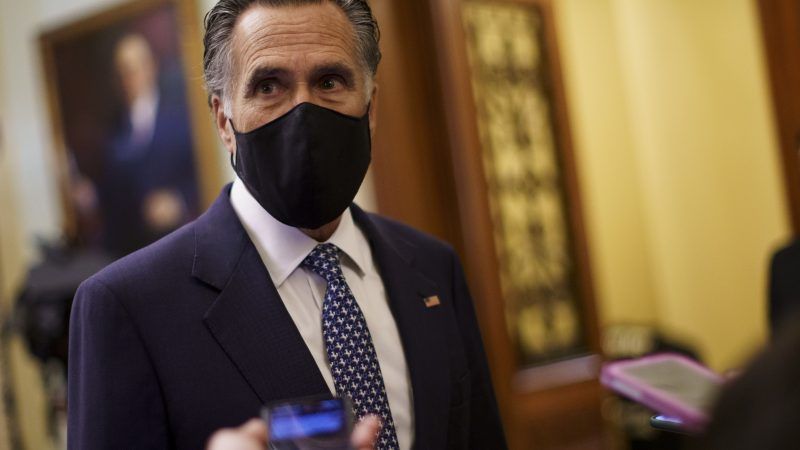Romney and Cotton Want to Punish Businesses With Minimum Wage Hike and More Immigration Paperwork
Leading Republicans continue to find dubious areas of agreement with Democrats.

Sen. Mitt Romney (R–Utah) spent the last several years at the forefront of the unofficial anti-Trump conservative coalition on Capitol Hill. In his latest turn, however, he is taking a cue from the populist Trumpian policy agenda, announcing a proposed increase to the federal minimum wage.
There's a catch. "I'm introducing a bill with @SenTomCotton that would increase the minimum wage," tweeted Romney, "while ensuring businesses cannot hire illegal immigrants. We must protect American workers."
Romney added that the proposal "gradually raises the minimum wage without costing jobs, setting it to increase automatically with inflation."
Members of the GOP have historically rebuffed such efforts, casting them as an economically unsound, one-size-fits-all band-aid that takes away state agency and spurs job losses. The data are on their side: A recent Congressional Budget Office report noted that increasing the minimum wage to $15 an hour would lift 900,000 people out of poverty but simultaneously destroy 1.4 million jobs—a metric that was held up as proof positive that Democrats' recent push to pass that minimum wage increase via budget reconciliation would hurt the people they want to help.
Though the Romney-Cotton bill has yet to be unveiled, how exactly they plan to skirt job losses remains unclear—even if the figure they settle on sits below that magic $15 number. It appears they both believe some of that will be offset by ensuring undocumented immigrants stay unemployed, though that will not help native workers displaced by wages that employers cannot sustain.
What's more, Romney will be disappointed to find that shutting immigrants out does not "protect American workers" as he claims—something a bipartisan group in the House acknowledged as recently as 2019 when they passed the immigration-friendly Farm Workforce Modernization Act.
"While some worry that these visas displace American workers, U.S. farmers are required by law to offer H-2A positions first to people who can already legally work in the U.S. They seldom find enough takers," I wrote at the time. "The Cornell Farmworker Program found that dairy farmers rely on undocumented workers because they cannot identify a sufficient amount of U.S.-born employees to fill the positions. This might explain why approximately 50 percent of all farmworkers are undocumented immigrants, according to the Department of Agriculture."
The immigration component aside, forcing businesses to increase labor costs, especially during a pandemic when many are lucky to keep the lights on, would naturally have a suppressant effect on employment. But the effort is indicative of a relatively new brand forming in some parts of the GOP, made up of traditional rightward social views with a leftward tilt on economic policy. "There are a lot of areas of potential overlap," Oren Cass, an aide on Romney's presidential runs in 2008 and 2012, told The New York Times. "There's a hypothetical governing majority to be drawn around the things we're talking about that doesn't exist within either party."
Cass is now the founder of American Compass, the goal of which is to determine "what the post-Trump right-of-center is going to be." Romney's bill is a good example of where that's headed: a Venn Diagram where the left and the right increasingly see eye to eye on solutions that create more problems than they solve.
